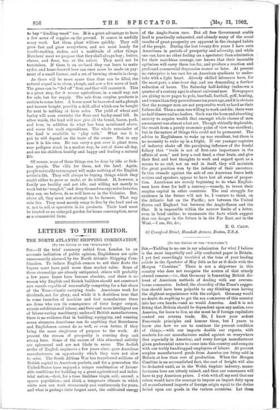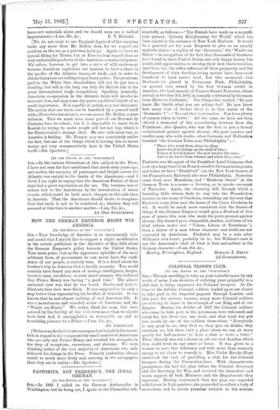[TO THE EDITOR OP THE "SPECTATOR."]
Sin,—Yielding to no one in my admiration for what I believe is the most impartially and ably conducted paper in Britain. I yet feel exceedingly troubled at the tone of your leading article in the Spectator of May 24th as far as it deals with the Morgan " Combine." There is not a shipowner in this country who does not recognise the source of that utterly absurd rumour,—i.e., that Germany is fomenting British dis- trust of American methods of dealing with our oversea- borne commerce. Indeed, the absurdity of the Times's sugges- tion should have been palpable to any thinking man having the slightest acquaintance with the subject. Germany would no doubt do anything to get the sea commerce of this country into her own hands,—and so would America. And it is not fitting that Britain should be dependent upon any nation, even America, for leave to live, as she must be if foreign capitalists control our oversea trade. Sir, I know your ardent Free-trade principles and honour them, but I yearn to know also how we are to continue the present condition of things,—with our imports double our exports, with markets for our manufactures sealed against us everywhere (but especially in America), and every foreign manufacturer given preferential rates to come into this country and compete with our trebly handicapped employers of labour. At present surplus manufactured goods from America are being sold in Britain at less than cost of production. When the Morgan Combine is an accomplished fact, the cost of freight will also be deducted until, as in the Welsh tinplate industry, manu- facturers here are utterly ruined, and then our consumers will have to pay American prices. I wish with all my soul that our rulers would have the courage to impose an import duty upon all manufactured imports of foreign origin equal to the duties levied upon our goods in the various countries. Let them
leave raw materials alone, and we should soon see a radical improvement.—I am, Sir, &c., F. T. BrixEar.
We do not want to see England deprived of her carrying trade any more than Mr. Bullen does, for we regard our position on the sea as a priceless heritage. Actin, we have no special liking for Trusts, but as Free-traders regard them as very undesirable products of the American commercialsystem. We refuse, however, to get into a state of wild excitement because American capitalists are anxious to have a share in the profits of the Atlantic transport trade, and in order to obtain that share are willing to pay fancy prices. The premiums paid to the White Star shareholders will not be put into a stocking, but will in the long run help the British side in the great international trade competition. Speaking generally, American co-operation in the Atlantic trade will involve no economic loss, and may some day prove a political benefit of no small importance. It is capable of acting as a war insurance. The notion that our trade can be benefited by a general tariff with a Protective intention is, we can assure Mr. Bullen, a pure delusion. That we must raise some part of our Revenue by Customs dues we admit ; but it is impossible to make trade flourish by trying to make people sell but not buy, which is the Protectionist's strange ideal. He who sells must buy, as America is finding. Mr. Morgan may not consciously realise the fact, but one of the things which is forcing him to invest money not very remuneratively here is the United States tariff.—En. Spectator.]











































 Previous page
Previous page